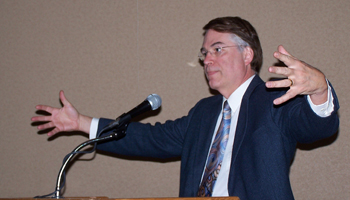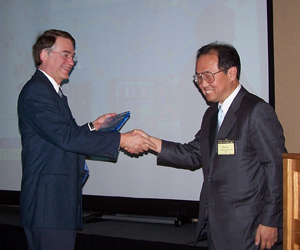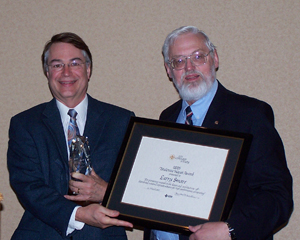IEEE Computer Society Honors Internet Pioneer and Calit2 Director Larry Smarr
San Diego, CA and Sedona, AZ, March 21, 2007 -- The director of the California Institute for Telecommunications and Information Technology (Calit2), Larry Smarr, has received the prestigious Tsutomu Kanai Award from the world's largest association of computer professionals. He was cited for outstanding contributions in the area of distributed computing systems.
|
The IEEE Computer Society bestowed the award today on Smarr during a joint session of the 8th International Symposium on Autonomous Decentralized Systems (ISADS 2007), the 11th IEEE International Workshop on Future Trends of Distributed Computing Systems (FTDCS 2007), and the 2nd International Workshop on Ad Hoc, Sensor and P2P Networks (AHSP2007), in Sedona, AZ.
An active computer science researcher, Smarr is a professor in the University of California, San Diego's Jacobs School of Engineering. He is the principal investigator on the National Science Foundation-funded OptIPuter project and the Moore Foundation-funded Community Cyberinfrastructure for Advanced Microbial Ecology Research and Analysis (CAMERA) metagenomics project. He is also Co-PI on the NSF-funded Laboratory for the Ocean Observatory Knowledge INtegration Grid (LOOKING) grant, and the Quartzite optical networking project.
An astrophysicist by training, Smarr -- whose 1983 proposal to NSF helped drive formation of the national supercomputing program as a way to make high-performance computing resources available to fellow scientists -- has long been a pioneer in the prototyping of a national information infrastructure to support academic research, governmental functions, and industrial competitiveness. He has driven major contributions to the development of the Internet, the web, the emerging Grid, collaboratories, and scientific visualization.
|
He has been deeply involved in writing a long series of key national reports which drove federal funding for distributed computing. These range from the "Report of the NSF Subcommittee on Computational Facilities for Theoretical Research to the Advisory Committee for Physics" (Press Report) in 1980, to "Evolving the High Performance Computing and Communications Initiative to Support the Nation's Information Infrastructure" (Brooks-Sutherland NRC Report in 1995), and in 1999, the President's Information Technology Advisory Committee report, "Information Technology Research: Investing in Our Future."
Smarr joined the Computer Science and Engineering faculty at UC San Diego in 2000, and the same year became founding director of Calit2, a partnership between UC San Diego and UC Irvine. Previously, he was the founding director of the National Center for Supercomputing Applications (NCSA) at the University of Illinois at Urbana-Champaign.
Smarr received his Ph.D. from the University of Texas at Austin and conducted observational, theoretical, and computation-based astrophysical sciences research for 15 years before becoming director of NCSA. He is a member of the National Academy of Engineering and a Fellow of the American Physical Society and the American Academy of Arts and Sciences. In 1990 Smarr received the Franklin Institute's Delmer S. Fahrney Gold Medal for Leadership in Science or Technology. In 2006 he was presented with the ESRI Lifetime Achievement Award. He is a USC Annenberg Fellow and a Crick-Jacobs Senior Fellow at La Jolla's Salk Institute for Biological Studies.
A former member of the President's Information Technology Advisory Committee, Smarr served until 2005 on the Advisory Committee to the Director of the National Institutes of Health, and to the NASA Advisory Council. He is currently a member of the federal government's Networking and Information Technology Advisory Group which provides input and feedback to the U.S. President's Council of Advisors on Science and Technology. He was named a member of the California Governor's Task Force on Broadband in December 2006.
|
Related Links
IEEE Computer Society
ISADS 2007
FTDCS 2007
AHSP 2007
Tsutomu Kanai Award
OptIPuter
CAMERA
LOOKING
Media Contacts
Media Contact: Doug Ramsey, 858-822-5825, dramsey@ucsd.edu or Pamela Kemper, 202-371-0101 x.4009, pkemper@computer.org



